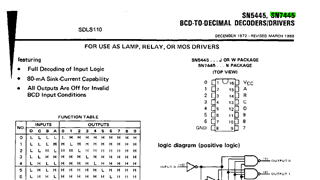Tool/software:
Hello,
I'm measuring leakage current on the outputs of the SN7445N with a Keithley 2400 SourceMeter when the outputs are in a high (off) state. The SN7445N device is on a VME compliant module and running between 4.75 VDC and 5.25 VDC. I'm using the Keithley to force 0.6 V on these outputs and measure the resulting current.
Per Rule 6.22 of the VME spec...
"Current sourced by board (the module/device in this case) at 0.6 V, including leakage current [IOZL+IIL] shall be <= 600 uA"
My problem is not so much that the board is not sourcing current when I apply 0.6 V with the Keithley 2400, but that it is actually sinking a very small amount of current, approximately 20 to 70 nA.
The limits of my test are: -600 uA < measured current < +0.060 uA. Negative current meaning coming out of the module/device into the Keithley, and positive current going into the module/device and out of the Keithley.
The VME spec does not specify an upper limit, and currently my limit is +60 nA. I calculated that limit from the Keithley 2400 Specification 1 year measurement accuracy on the 1 mA measurement range. The formula is 0.027% + 60 nA. So that means 0.027 x reading [zero expected amps] + 60 nA = 60 nA.
When testing at 25 degrees C, the module/device passes the test. However, at 55 degrees C, the leakage current measurement on the module/device goes up above the upper limit of 60 nA to around 70 nA.
I need to justify a limit change for my test and was wondering if you had any data from previous testing about what I should expect for a worst-case leakage current when applying a small voltage such as 0.6 V to these outputs in the high (off) state.
It seems like I'm looking for the worst-case leakage current an open collector output (high/off) state at 0.6 V @ 55 degrees C.
References:




Thank you for your assistance!
Mike


 The closest spec here is the Off-state output current.
The closest spec here is the Off-state output current.